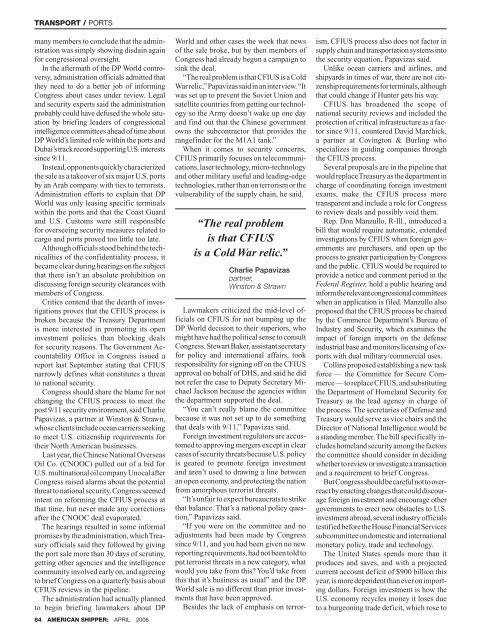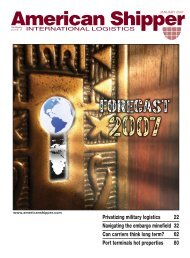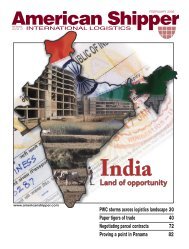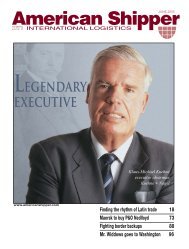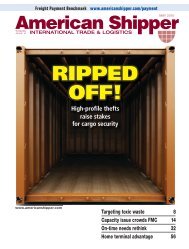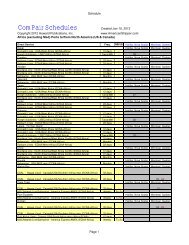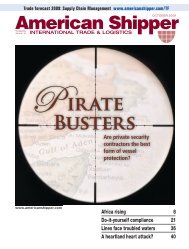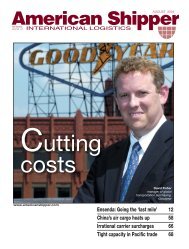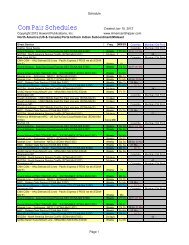McLean's - American Shipper
McLean's - American Shipper
McLean's - American Shipper
- No tags were found...
You also want an ePaper? Increase the reach of your titles
YUMPU automatically turns print PDFs into web optimized ePapers that Google loves.
TRANSPORT / PORTSmany members to conclude that the administrationwas simply showing disdain againfor congressional oversight.In the aftermath of the DP World controversy,administration officials admitted thatthey need to do a better job of informingCongress about cases under review. Legaland security experts said the administrationprobably could have defused the whole situationby briefing leaders of congressionalintelligence committees ahead of time aboutDP World’s limited role within the ports andDubai’s track record supporting U.S. interestssince 9/11.Instead, opponents quickly characterizedthe sale as a takeover of six major U.S. portsby an Arab company with ties to terrorists.Administration efforts to explain that DPWorld was only leasing specific terminalswithin the ports and that the Coast Guardand U.S. Customs were still responsiblefor overseeing security measures related tocargo and ports proved too little too late.Although officials stood behind the technicalitiesof the confidentiality process, itbecame clear during hearings on the subjectthat there isn’t an absolute prohibition ondiscussing foreign security clearances withmembers of Congress.Critics contend that the dearth of investigationsproves that the CFIUS process isbroken because the Treasury Departmentis more interested in promoting its openinvestment policies than blocking dealsfor security reasons. The Government AccountabilityOffice in Congress issued areport last September stating that CFIUSnarrowly defines what constitutes a threatto national security.Congress should share the blame for notchanging the CFIUS process to meet thepost 9/11 security environment, said CharliePapavizas, a partner at Winston & Strawn,whose clients include ocean carriers seekingto meet U.S. citizenship requirements fortheir North <strong>American</strong> businesses.Last year, the Chinese National OverseasOil Co. (CNOOC) pulled out of a bid forU.S. multinational oil company Unocal afterCongress raised alarms about the potentialthreat to national security. Congress seemedintent on reforming the CFIUS process atthat time, but never made any correctionsafter the CNOOC deal evaporated.The hearings resulted in some informalpromises by the administration, which Treasuryofficials said they followed by givingthe port sale more than 30 days of scrutiny,getting other agencies and the intelligencecommunity involved early on, and agreeingto brief Congress on a quarterly basis aboutCFIUS reviews in the pipeline.The administration had actually plannedto begin briefing lawmakers about DP84 AMERICAN SHIPPER: APRIL 2006World and other cases the week that newsof the sale broke, but by then members ofCongress had already begun a campaign tosink the deal.“The real problem is that CFIUS is a ColdWar relic,” Papavizas said in an interview. “Itwas set up to prevent the Soviet Union andsatellite countries from getting our technologyso the Army doesn’t wake up one dayand find out that the Chinese governmentowns the subcontractor that provides therangefinder for the M1A1 tank.”When it comes to security concerns,CFIUS primarily focuses on telecommunications,laser technology, micro-technologyand other military useful and leading-edgetechnologies, rather than on terrorism or thevulnerability of the supply chain, he said.“The real problemis that CFIUSis a Cold War relic.”Charlie Papavizaspartner,Winston & StrawnLawmakers criticized the mid-level officialson CFIUS for not bumping up theDP World decision to their superiors, whomight have had the political sense to consultCongress. Stewart Baker, assistant secretaryfor policy and international affairs, tookresponsibility for signing off on the CFIUSapproval on behalf of DHS, and said he didnot refer the case to Deputy Secretary MichaelJackson because the agencies withinthe department supported the deal.“You can’t really blame the committeebecause it was not set up to do somethingthat deals with 9/11,” Papavizas said.Foreign investment regulators are accustomedto approving mergers except in clearcases of security threats because U.S. policyis geared to promote foreign investmentand aren’t used to drawing a line betweenan open economy, and protecting the nationfrom amorphous terrorist threats.“It’s unfair to expect bureaucrats to strikethat balance. That’s a national policy question,”Papavizas said.“If you were on the committee and noadjustments had been made by Congresssince 9/11, and you had been given no newreporting requirements, had not been told toput terrorist threats in a new category, whatwould you take from this? You’d take fromthis that it’s business as usual” and the DPWorld sale is no different than prior investmentsthat have been approved.Besides the lack of emphasis on terrorism,CFIUS process also does not factor insupply chain and transportation systems intothe security equation, Papavizas said.Unlike ocean carriers and airlines, andshipyards in times of war, there are not citizenshiprequirements for terminals, althoughthat could change if Hunter gets his way.CFIUS has broadened the scope ofnational security reviews and included theprotection of critical infrastructure as a factorsince 9/11, countered David Marchick,a partner at Covington & Burling whospecializes in guiding companies throughthe CFIUS process.Several proposals are in the pipeline thatwould replace Treasury as the department incharge of coordinating foreign investmentexams, make the CFIUS process moretransparent and include a role for Congressto review deals and possibly void them.Rep. Don Manzullo, R-Ill., introduced abill that would require automatic, extendedinvestigations by CFIUS when foreign governmentsare purchasers, and open up theprocess to greater participation by Congressand the public. CFIUS would be required toprovide a notice and comment period in theFederal Register, hold a public hearing andinform the relevant congressional committeeswhen an application is filed. Manzullo alsoproposed that the CFIUS process be chairedby the Commerce Department’s Bureau ofIndustry and Security, which examines theimpact of foreign imports on the defenseindustrial base and monitors licensing of exportswith dual military/commercial uses.Collins proposed establishing a new taskforce — the Committee for Secure Commerce— to replace CFIUS, and substitutingthe Department of Homeland Security forTreasury as the lead agency in charge ofthe process. The secretaries of Defense andTreasury would serve as vice chairs and theDirector of National Intelligence would bea standing member. The bill specifically includeshomeland security among the factorsthe committee should consider in decidingwhether to review or investigate a transactionand a requirement to brief Congress.But Congress should be careful not to overreactby enacting changes that could discourageforeign investment and encourage othergovernments to erect new obstacles to U.S.investment abroad, several industry officialstestified before the House Financial Servicessubcommittee on domestic and internationalmonetary policy, trade and technology.The United States spends more than itproduces and saves, and with a projectedcurrent account deficit of $900 billion thisyear, is more dependent than ever on importingdollars. Foreign investment is how theU.S. economy recycles money it loses dueto a burgeoning trade deficit, which rose to


